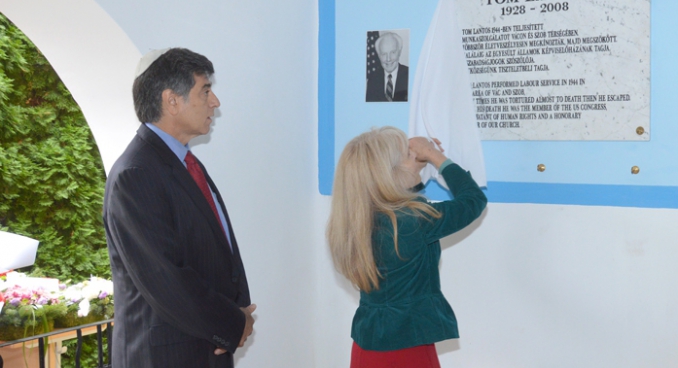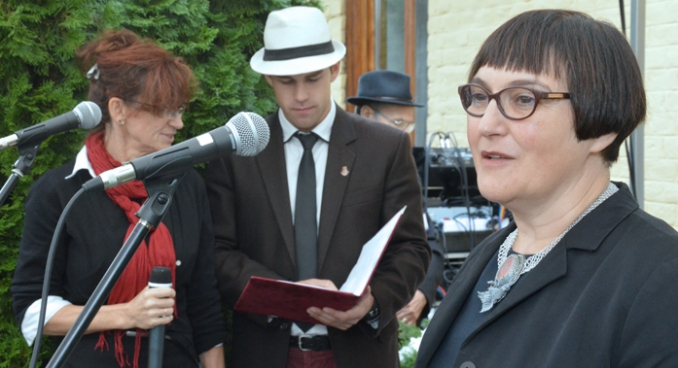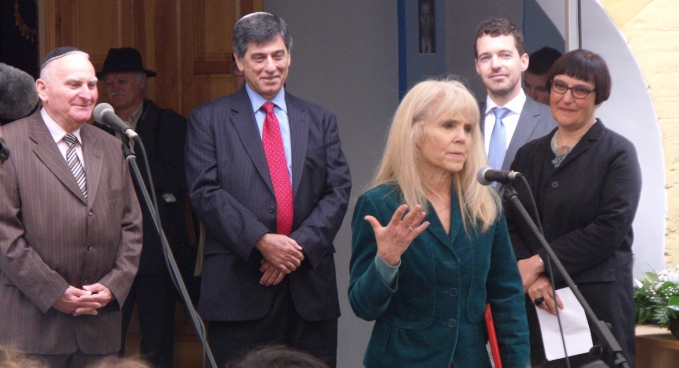Unveiling of the Tom Lantos plaque in Vác
On 19 September four plaques commemorating Tom Lantos, Miklós Radnóti, Snr. József Antall, and Henryk Sławik were inaugurated in the hall of the Regional Centre for Holocaust Education and Research and Jewish Tourism, located in the Historical Cemetery of the Jewish Faith Commune of Vác.
The ceremony started with the reciting of Miklós Radnóti’s poem, “Nem tudhatom…”, which begins with the lines: How others see this region, I cannot understand: / to me, this little country is menaced motherland (translation by Thomas Ország-Land).
Despite the fact that both Miklós Radnóti and Tom Lantos were proud Hungarians, it was their own nation which persecuted them, because they were of Jewish descent. Radnóti signed his name on his notebook with the title “Hungarian poet” and as the daughter of Tom Lantos, Annette Lantos Tillemann-Dick emphasised, her father found it very difficult that he could not return home after the war, and always cherished his homeland, took his family there on vacation and taught her daughters folk songs. Miklós Radnóti and Tom Lantos spent part of their labour service in and near Vác, Tom Lantos had to work on a rail bridge at night time, since during the day it was being bombarded by the Allied Forces. He tried to escape but was caught and almost beaten to death. He was left unconscious but when he came round he attempted a second escape successfully and ultimately survived the war.
As M. André Goodfriend, Chargé d’Affairs of the Embassy of the United States said, Tom Lantos was a bridge builder. He not only worked on the rail bridge near Vác, but also built the bridge between the American and the Hungarian nation. And let us not forget that the Jewish community was and is an integral part of the Hungarian society, and as Péter Harrach MP reminded the commemorators, “we are all, as members of society, responsible for each other”.
Similarly, we need to take responsibility for what our Hungarian society had done in the past, as Anna-Mária Bíró, director of the Tom Lantos Institute emphasised, and face that, according to recent historical research, around 200 000 Hungarian public servants took part in one way or another in the deportations in 1944. There is always a choice of good and bad, said Péter Harrach, and Snr. József Antall and Henryk Slawik, who both saved thousands of Jews are worthy of becoming our role models, for making the right choice in those difficult times.
In the orphanage established by József Antall and Henryk Slawik for Jewish children there was Catholic mass every morning and in the afternoon the pupils studied the Tora, related János Turai, leader of the Jewish Faith Commune of Vác. Members of different churches have always lived in peace in Vác, and this mutual respect was emphasised by the participation of various church leaders, who blessed the plaques together.
Photos: Miklós Váli




